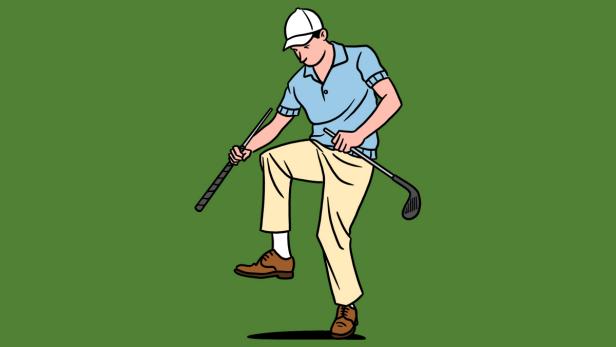Golf
‘What a stupid hole!’: When excuses actually help

This story first appeared in Low Net, a weekly newsletter dedicated to golf through the eyes of average players. The newsletter will be for Golf Digest+ members. To receive yours weekly sign up for Golf Digest+.
The only athletic pursuit that rivals my obsession with golf is playing and coaching hockey, where a typical weekend recap sounds something like this:
Yeah, we lost 3-0, but were only down 1-0 after two and we also hit two posts. Plus, the stupid ref missed a bunch of calls.
Every game comes with an “additional layer of context,” which can be roughly translated as “lame set of excuses.” If this sounds similar to your post-round conversations, that’s the point. Even golfers in tune with their deficiencies like to cite additional factors that submerge us into deeper holes: unfortunate bounces, idiotic pin placements, glacial groups ahead plumb-bobbing every three-footer.
I’ve always believed excuses like these are toxic, and often a separating factor between fragile and steely competitors. Turns out I’ve neglected where they can actually help.
“This will sound weird, but I think excuses when you’re on the golf course are OK,” said Golf Digest Top 50 Teacher Tony Ruggiero, who works with a number of tour players as well as top amateurs and juniors. “I think good players do that. They’ll say it’s not them. That’s generally why they don’t have fear.”
Below: Golf Digest’s Coleman Bentley constructed the ultimate Summer Golf Excuse Bracket.
It’s not that Ruggiero is giving us carte blanche to blame every misplaced shot on something else. Even this has limits, which I’ll get to in a moment. But there are occasions when an excuse is preferable to calling yourself an idiot for 18 consecutive holes (been there, doesn’t work).
“I’ve talked to players whose self-talk is so bad on the golf course. Everything is, ‘they suck,’ and it’s brutal,” Ruggiero said. “The guys that blame other things on the golf course tend to do better.”
Without even knowing it I resorted to strategic excuse-making last week. I had been cruising through the front nine before I made the mistake of checking my phone while walking to my drive in the fairway. An urgent text led to an urgent call, and the next thing I knew I was shanking my 8-iron approach into the water. I ended up making a mess of the eighth and ninth holes, but at least I could point to why. By the time I arrived at the 10th tee, I was ready to move on.
“That’s totally normal and healthy,” Ruggiero said.
There is a flip slide, however. As much as excuses can help in the moment, if you’re making them throughout the round, you’re now doing more harm than good. It’s the difference between constructively flushing a bad shot from your memory and taking an incomplete inventory of what’s holding you back.
“Where I think people don’t get better is when they get off the golf course and they start blaming every other thing for why they don’t get better, or why they don’t play well,” Ruggiero said. “If you’re seriously analyzing where your game is going and how to get better when you’re done having a beer, then I think excuses are bad. You gotta be realistic.”
In any sport, there is a thin line between giving yourself a break and ignoring the harsh truth. As any good hockey coach will tell you, it’s OK to blame bad luck once in a while. But at some point you need to figure out how to score more goals than the other team.


)






